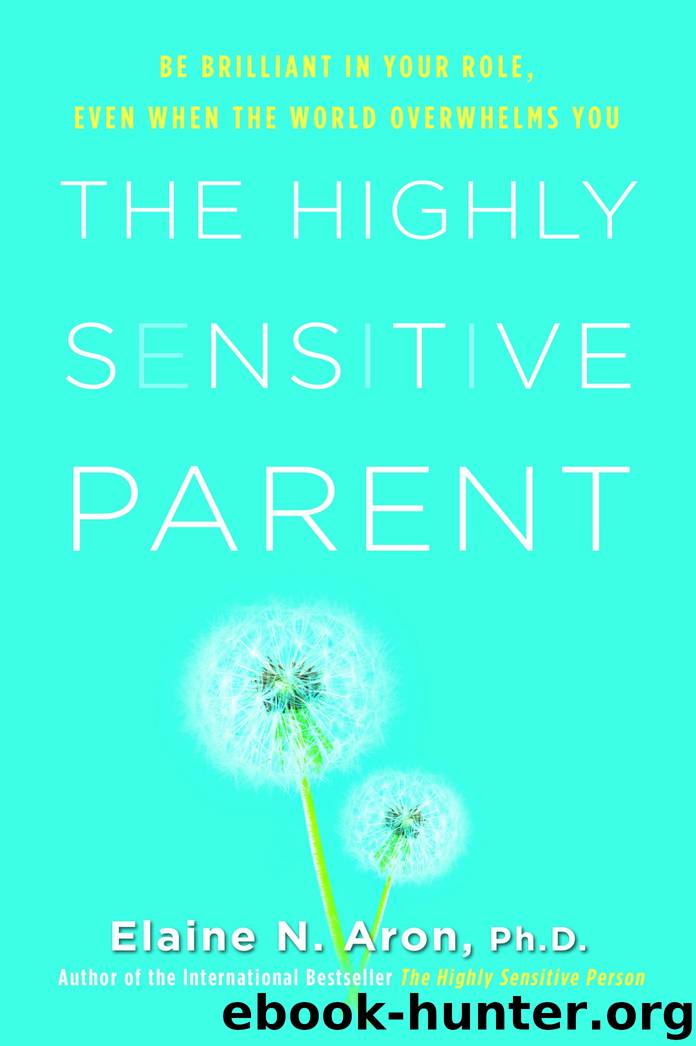The Highly Sensitive Parent by Elaine Aron

Author:Elaine Aron [Aron, Elaine]
Language: eng
Format: epub
Publisher: Citadel Press
Published: 2020-01-30T00:00:00+00:00
UNHAPPINESS AND DEPRESSION
Discontent is another common problem for all parents. One remembers now and then the “good life” before children and wonders when the chaos, lack of sleep, early rising, and the lack of time for anything but the children will ever end? Trust me, it does. For HS parents, the greater problem may be feeling wrong for having these feelings. HSPs have a history of feeling different from others, so they think they are different here, too. Spending time in a parent support group could be the best cure. If you dare to speak your feelings out loud, you will hear many others with similar feelings.
Depression is obviously more troubling. Depression during pregnancy and in the first three months after the birth is common for all mothers. (I’ll get to fathers in a moment.) According to some statistics, about 15 percent of women have true depression, and up to 85 percent have a milder form with some symptoms, but not all. However, from our survey, the real postpartum kind of depression does not appear to be more common for HS mothers, perhaps because it is largely hormonal.
What about fathers? About 10 percent report depression, mostly in the three to six months after their child’s birth. Fathers do have hormonal changes, although the larger factor would seem to be their change in role (more protective and more work, less direct attention and sexual interest from spouse). Fathers do have just as much empathy for their child, as shown by brain imaging. So we might presume that HS fathers, with those areas already more active than others, have even more empathy. Empathy when mother or child is under stress means Dad is under stress, too.
Poverty and stress make depression lasting past the first three months more likely in any parent. On the other hand, depression is less likely when the family has help after the birth—again, proving my point about the need for help. Anxiety, the other intense emotion during this period, plays a huge role in depression, as well. In many ways, biologically, depression and anxiety are two sides of the same coin, with one predominating at times or in some people, and the other predominating at others. Fathers can suffer from both of these, although they tend to do so a bit less than mothers.
For an HS parent, depression after the first three months, or at any time while parenting, may be especially likely to occur during times of stress or sleep loss. Plus if you had a difficult childhood, then the differential susceptibility I mentioned in chapter two that is common to all HSPs would make you more susceptible to depression now (just as a good childhood would make you less susceptible). Interestingly, however, in our survey, HS parents who said yes to “my own childhood was difficult” did not report their experiences of parenting, including depression or regret, to be any worse than parents who were not highly sensitive.
What do you do if you might be depressed too often? First, face it.
Download
This site does not store any files on its server. We only index and link to content provided by other sites. Please contact the content providers to delete copyright contents if any and email us, we'll remove relevant links or contents immediately.
Rewire Your Anxious Brain by Catherine M. Pittman(18213)
Talking to Strangers by Malcolm Gladwell(12797)
The Art of Thinking Clearly by Rolf Dobelli(9812)
Mindhunter: Inside the FBI's Elite Serial Crime Unit by John E. Douglas & Mark Olshaker(8650)
Becoming Supernatural by Dr. Joe Dispenza(7794)
Change Your Questions, Change Your Life by Marilee Adams(7321)
The Road Less Traveled by M. Scott Peck(7233)
Nudge - Improving Decisions about Health, Wealth, and Happiness by Thaler Sunstein(7193)
The Lost Art of Listening by Michael P. Nichols(7105)
Mastermind: How to Think Like Sherlock Holmes by Maria Konnikova(6895)
Enlightenment Now: The Case for Reason, Science, Humanism, and Progress by Steven Pinker(6844)
Win Bigly by Scott Adams(6788)
The Way of Zen by Alan W. Watts(6255)
Daring Greatly by Brene Brown(6190)
Big Magic: Creative Living Beyond Fear by Elizabeth Gilbert(5303)
Grit by Angela Duckworth(5262)
Men In Love by Nancy Friday(4931)
Ego Is the Enemy by Ryan Holiday(4891)
Altered Sensations by David Pantalony(4831)
